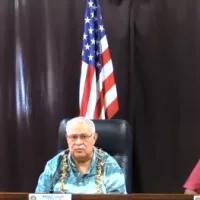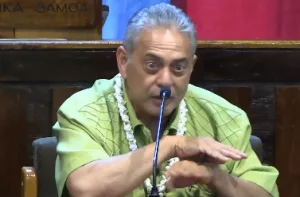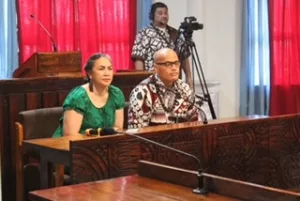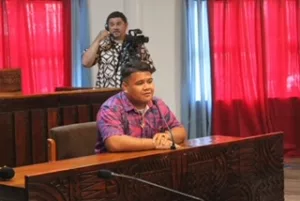
Seven people testified on the veto override amendment that will be on the ballot in the November 5 general election at Monday’s town hall meeting hosted by the Senate.
They included Swains Representative Su’a Alexander Jennings, Sinasina Joe Langkilde, Kenn and Luisa Kuaea, James McGuire, Kiso Skelton and Nathaniel Savali.
Senate President Tuaolo Manaia Fruean led the discussion.
Sinasina Joe Langkilde said he was there to listen and get an understanding of the purpose of the veto override amendment.
Senator Malaepule Saite Moliga explained that the three branches of government have distinct and separate functions.
The veto override amendment would ensure there’s an equal check and balance between the Legislature and the Executive branch. He said, currently, if the Governor vetoes a bill, the Fono does not have the power to change the Governor’s decision. If the veto override proposal is passed, the Fono would be able to pass over the Governor’s veto and that decision is final. This he said is “true democracy.” The vetoed bill does not have to go to the Secretary of the Interior for a final approval as is required now.

Rep. Su’a Alexander Jennings
Malaepule said the proposed amendment is not intended to acquire more power for the Fono, but rather to ensure equal balance of power among the branches of government.
He said our ancestors who laid the foundation for our government left it to subsequent generations to make changes that are befitting the times.

Kenn & Luisa Kuaea
Senate President Tuaolo also explained that any change to the constitution currently has to be submitted to the Secretary of the Interior and then to Congress, but a bill that Congresswoman Uifaatali Amata introduced would remove Congress from the review and approval process.
Sinasina said he now understands and he will support the veto override amendment, but he felt that having Congress pass changes to the constitution would be a lengthy process.
Swains Representative Su’a Alexander Jennings said that the veto override provision in the constitution should have been changed the day that American Samoa first elected its own governor. The veto override should rest with the Fono for checks and balance he reiterated. He believed review and approval by Congress of changes to American Samoa’s constitution has provided a check and balance over the Department of Interior’s response to American Samoa. He said for the last 46 years, “We have got everything we asked for from Interior because Congress is there.”
Kenn and Luisa Kuaea said they were also there to listen and get some understanding of the veto override. Luisa Kuaea observed that in the 2022 election, 61 percent voted against the veto override; and said perhaps the people did not have enough understanding of the measure and also that there was some element of distrust if the Secretary of Interior is removed from approval of bills vetoed by the Governor.

Kiso Skelton
After hearing explanations from the senators, Ms. Kuaea said she supports self governance and agrees that the final decision on a vetoed bill is made by the Fono not the Secretary of the Interior.
Kiso Skelton said that one of the concerns that led him to vote no on the veto override amendment in previous elections, and a concern from friends that he’s talked to, is that while American Samoa is being likened to a democracy that’s the same as in the United States, in reality, only the House of Representatives is voted while the Senate is not. He said there’s a feeling that voters can check on members of the House through the voting process, but that can’t be said about the Senate.
Senator Malaepule explained that when the Fono was first formed, it was a single chamber House of Alii. Later on, the chiefs and leaders of Tutuila and Manu’a—with the approval of the US government—felt that there was a need to have a popularly elected chamber which became the House of Representatives, while the upper chamber or Senate was selected by districts from among leading matai through eh process of consensus.
He said young people should not think that only the House is elected by popular vote. The voice of the people in selection of senators comes through their traditional leaders at the district level.
James McGuire said he supports the veto override amendment.
Attorney Nathaniel Savali, the counsel for the Fono testifying in his individual capacity, said while people understand the basic principal of the veto override, they are not familiar with the history behind it. A question he asks is why the veto override is included in the constitution. He said from research, the Interior Department was uncomfortable and unsure that we were mature enough to make our own decisions; and they did not want the Fono to question the governor’s decisions.
Play Audio



